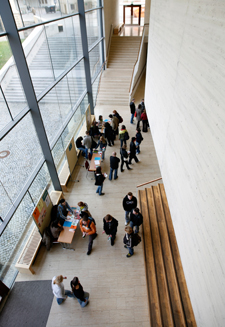
Further settings
- Language: Deutsch
- Fontsize: increase , decrease
- Enhanced search
- Subscribe: RSS
- News archive
Creating knowledge since 1502
Apply here!
Please click here for information on application for:Degree-Seeking Students ERASMUS / Exchange Students / Free Mover
Denken viele Köpfe besser als einer? Psychologe der MLU erhält Förderung aus dem „Human Frontier Science Program“
Was macht gute Teams aus? Wie können Gruppen besser als ihre einzelnen Mitglieder sein? Mit der Gruppenintelligenz befasst sich der Psychologe Jun.-Prof. Dr. Markus Spitzer von der MLU. Gemeinsam mit Forschenden aus Spanien, den USA und Großbritannien erhält er eine Förderung des "Human Frontier Science Program" über rund 1,5 Millionen Euro. Die Förderquote des Programms liegt bei nur sieben Prozent. Das Team setzt für sein Projekt auf eine besondere Mischung aus umfangreichen Experimenten, Künstlicher Intelligenz und Computer-Bots.
Unterricht der Zukunft: Wissenschaftsmagazin „scientia halensis“ widmet sich Lehrerbildung
Mit der Ausbildung künftiger Lehrerinnen und Lehrer befassen sich die Titelgeschichten der neuen Ausgabe des Wissenschaftsmagazins "scientia halensis" der MLU, die zur Langen Nacht der Wissenschaften am 5. Juli erschienen ist. Unter dem Titel "Unterricht der Zukunft" wird darin zum Beispiel aufgezeigt, wie Ergebnisse aktueller Forschungen in das Lehramtsstudium einfließen.
Physikerin Ingrid Mertig erhält Seniorprofessur der Wilhelm und Else Heraeus-Stiftung
Prof. Dr. Ingrid Mertig von der Martin-Luther-Universität Halle-Wittenberg (MLU) ist mit einer besonderen Förderung ausgezeichnet worden: Die Physikerin hat gestern eine Seniorprofessur der Wilhelm und Else Heraeus-Stiftung erhalten. Mertig nutzt die dreijährige Förderung, um 60 Video-Vorlesungen zur theoretischen Physik zu erarbeiten. Mit der Seniorprofessur unterstützt die Heraeus-Stiftung Forschende im Ruhestand, die sich für eine verbesserte Lehre an ihrer Hochschule einsetzen.
New study in "Science": Climate change could
become the main driver of biodiversity decline by
mid-century. Largest modelling study of its kind
Global biodiversity has declined between 2% and 11% during the 20th century due to land-use change alone, according to a large multi-model study published in Science. Projections show climate change could become the main driver of biodiversity decline by the mid-21st century. The analysis was led by the German Centre for Integrative Biodiversity Research (iDiv) and the MLU and is the largest modelling study of its kind to date. The researchers compared thirteen models for assessing the impact of land-use change and climate change on four distinct biodiversity metrics, as well as on nine ecosystem services.
Study shows how plants influence Europes climate
The climate regulates plant growth and yet the climate is also influenced by plants. A study by Martin Luther University Halle-Wittenberg (MLU), which was published in the journal "Global Change Biology", has found that ecosystems can have a strong impact on Europe's climate depending on their plant mix. The researchers combined satellite data with around 50,000 vegetation records from across Europe. A good five per cent of regional climate regulation can be explained by local plant diversity. The analysis also shows that the effects depend on many other factors. Plants are able to influence the climate by reflecting sunlight, or cool their surroundings through evaporation.
Scientists develop novel RNA- or DNA-based substances to protect plants from viruses
Individually tailored RNA or DNA-based molecules are able to reliably fight off viral infections in plants, according to a new study by the Martin Luther University Halle-Wittenberg (MLU), which was published in the "International Journal of Molecular Sciences". The researchers were able to fend off a common virus using the new active substances in up to 90 per cent of cases. They also developed a method for finding substances tailored specifically to the virus. The team has now patented the method.





